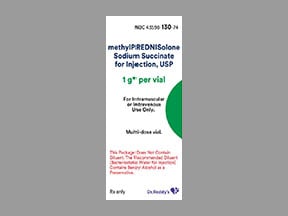
Solu-medrol Coupons & Savings Card – Discount Prices from $14.89
Brand for: Methylprednisolone sodium succ
My prescription
Edit
1000MG, Methylprednisolone Sodium Succ (1 Solution Reconstituted)
Select pharmacy

CVS
$45.46
COUPON PRICE
Albertsons
$14.89
COUPON PRICE
Walgreens
$16.03
COUPON PRICE
Walmart
$27.86
COUPON PRICESolu-medrol savings card
Show this card to your pharmacist
Albertsons
$14.89
BIN
ID
PCN
GRP
019876
LH1F05EC3E
CHIPPO
LHX
Powered by
Related corticosteroids prescriptions
More prescriptions for ulcerative colitis
Related corticosteroids prescriptions
More prescriptions for ulcerative colitis
Price history for Solu-medrol (brand) & Methylprednisolone Sodium Succ (generic)
1 Solution Reconstituted, 1000MG
Average retail price for Solu-medrol
Average retail price for Methylprednisolone Sodium Succ
Average SaveHealth price for Methylprednisolone Sodium Succ
Our price history data is based on aggregated prescription data collected from participating pharmacies in America. Our prescription data updates daily to reflect the latest price changes. If you notice a missing data point, it means there wasn't sufficient data available to generate a monetary value for that date.
Over the last 12 months, the average discount price of Solu-medrol is $29.68 using the SaveHealth savings card. That's an average savings of 78.65% on Solu-medrol with our discount card.
*Retail prices are based on pharmacy claims data, and may not be accurate when we don't have enough claims.
Solu-medrol (Methylprednisolone Sodium Succ) dosage forms
Dosage Quantity Price from Per unit 500MG 1 Solution Reconstituted $12.25 $12.25 1000MG 1 Solution Reconstituted $14.89 $14.89
| Dosage | Quantity | Price from | Per unit |
|---|---|---|---|
| 500MG | 1 Solution Reconstituted | $12.25 | $12.25 |
| 1000MG | 1 Solution Reconstituted | $14.89 | $14.89 |
What is solumedrol used for?
Solumedrol, which is a brand name for methylprednisolone, is used to reduce inflammation and suppress the immune system. It is commonly prescribed for conditions such as allergic reactions, asthma, rheumatoid arthritis, and certain autoimmune diseases. It may also be used to treat severe inflammation in various parts of the body.
Is Solu-Medrol the same as prednisone?
Solu-Medrol and prednisone are not the same, but they are both corticosteroids used to reduce inflammation. Solu-Medrol contains methylprednisolone, which is often administered intravenously or intramuscularly, while prednisone is typically taken orally. Both medications have similar effects but may be used in different clinical situations depending on the specific needs of the patient.
Where do you inject Solu-Medrol?
Solu-Medrol is typically administered by a healthcare professional. It can be injected intravenously (into a vein) or intramuscularly (into a muscle). The specific site of injection will depend on the patient's condition and the healthcare provider's assessment. It is important for the injection to be performed by a qualified healthcare provider to ensure proper administration and to minimize potential complications.
Can you give Solu-Medrol in deltoid?
Solu-Medrol (methylprednisolone) is typically administered via intramuscular injection, and the preferred site for such injections is the gluteal muscle. While it is possible to administer it in the deltoid muscle, this site is generally less preferred due to the smaller muscle mass and increased risk of complications. It is important to follow the prescribing physician's instructions and consider the patient's specific circumstances when choosing the injection site.
What does Solu-Medrol do for the lungs?
Solu-Medrol, which is a brand name for methylprednisolone, is a corticosteroid that can help reduce inflammation in the lungs. It is often used to treat conditions such as asthma, chronic obstructive pulmonary disease (COPD), and other inflammatory lung diseases. By decreasing inflammation, it can help improve breathing and reduce symptoms such as wheezing and shortness of breath.
